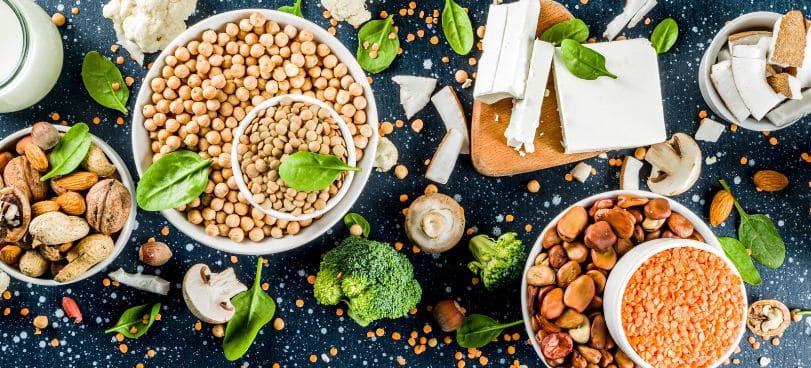How to Follow a Vegetarian Diet While Losing Weight
Vegetarian isn’t a byword for healthy, but following a balanced vegetarian diet can help you to lose weight.
So, whether you want to eat less meat to help weight loss or you’re a vegetarian looking for healthy eating advice, we’ve put together this guide to following a vegetarian diet while trying to shed a few pounds.
Types Of Vegetarian Diets
The most common vegetarian diet is the Lacto-Ovo vegetarian diet, where meat, fish, and poultry are excluded, but eggs and dairy products are consumed.
Some vegetarians may exclude eggs but eat dairy (Lacto-vegetarian diet), while others avoid dairy but eat eggs (Ovo-vegetarian).
A vegan diet is the strictest type of vegetarian diet as it excludes all animal products, including dairy, eggs, meat, fish, and poultry.
Why Follow A Vegetarian Diet?
Motives for following a vegetarian diet are varied, but from a health perspective, eating a balanced plant-based diet is likely to be lower in saturated fat.
This, in turn, reduces the risk of heart disease, diabetes, and some cancers.
By swapping meat for vegetables and legumes as the main focus of your meal, you are also likely to consume fewer calories when eating the same quantity of food.
Eating a wide range of plant-based foods will also provide you with more of the most essential nutrients needed to boost weight loss, as well as plenty of filling fiber.
Lastly, you could save money and calories; while high-quality lean meat can be expensive, many vegetarian staples like legumes, in-season produce, and oats are some of the most affordable healthy foods around.
How To Follow A Balanced Vegetarian Diet

Despite the advantages of following a vegetarian diet, it is possible to eat badly as a vegetarian.
Like any healthy diet, a balanced vegetarian diet requires you to eat various foods to get all the necessary nutrients.
Pack In Protein
Protein is crucial for weight loss as it supports muscle growth to help you tone up and burn more fat and calories.
The best tactic is ensuring you’re getting protein at every meal.
The Dietary Reference Intakes (DRI) states that individuals over 19 need 0.36g of protein per pound of body weight each day.
So, you will need to work out how much protein you need each day and then aim to eat a certain amount at each meal and snack.
Many people mistakenly think that protein is only found in animal products, but there are many plant-based protein sources.
Protein is available from soy milk, nuts, seeds, lentils, beans, tofu, seitan, buckwheat, and quinoa, as well as some vegetables.
Of course, if you’re still eating eggs and dairy, these are both ways to get good amounts of protein.
However, if you are relying solely on plant protein, then it’s important to take into account that plant proteins are ‘incomplete’ sources of protein.
This is because they don’t contain the full range of nine essential amino acids that animal proteins provide. So, to ensure that you get the full range of amino acids, you need to combine plant proteins with whole grains such as brown rice, whole-grain pasta, and oats.
Think bean Bolognese with whole-grain spaghetti, lentils, and brown rice, soy milk over whole-grain breakfast cereal, or a tasty salad with seeds, nuts, and quinoa.
Get Your Vitamins
Making sure you meet all your nutritional needs in terms of vitamins and minerals is essential for good health and successful weight loss.
With a vegetarian diet, especially one that excludes all animal products, a big concern is making up for the vitamins which won’t come readily in your diet.
Calcium, for example, is found in abundance in dairy products, but if you’re avoiding dairy, then your calcium will need to come from sources like sesame seeds, almonds, and white beans.
You can also buy non-dairy milk fortified with calcium, such as soy or almond milk, but it might be a good idea to ask your doctor if you need to take supplements to maintain good bone health.
Iron may also be a challenge because the iron in plant-based sources like beans, tofu, and green leafy vegetables is not as easily absorbed as the iron found in meat.
Eating these plant-based sources of iron alongside foods rich in vitamin C, such as strawberries, peppers, kiwi, and broccoli, helps your body absorb iron better.
Like iron, zinc is not as easily absorbed from plant sources as it is from animal products.
Cheese is a good option if you eat dairy products, but if not, plant sources of zinc include whole grains, soy products, legumes, and nuts.
Lastly, vitamin B12 is likely to be lacking if you follow a vegan diet.
Vitamin B12 comes from the bacterial synthesis of animal protein, so it is only found naturally in animal sources.
If you are following a vegetarian diet that allows dairy and eggs, then these are sources of B12.
And, it is possible to find products fortified in B12, such as tofu, yeast extract, and some breakfast cereals. Vitamin B12 is vital for the metabolism of fats and carbohydrates and for maintaining nerve impulses and bone marrow.
A deficiency in vitamin B12 may result in depression, low energy, and mood swings.
Many doctors prescribe vitamin B12 injections, but if your doctor doesn’t, then you may need to seek out a high-quality vitamin B12 supplement.
Don’t Forget Fats
It’s also crucial to ensure that your vegetarian diet includes plenty of sources of omega-3 and 6 essential fatty acids. These are important for good health as they help with cholesterol and aid brain and nervous tissue redevelopment.
Furthermore, these fats help to curb appetite by keeping us feeling full, and they reduce digestive inflammation, meaning less bloating and a flatter stomach.
You can find healthy fats in many plant sources, such as flax seeds, walnuts, green leafy vegetables, Brazil nuts, olive oil, and avocados.
However, some of these foods are high in calories, so it’s best not to overdo them.
Expand Your Diet
Vegetarian diets can sometimes rely too much on carb-heavy meals like avocado on toast and pasta with tomato sauce. Instead, you should focus on how versatile plant-based foods can be.
Make fruit and vegetables the focus of your meals, find new ways to combine and cook them, and be inventive and try out new recipes.
Put lentils in a stew or a salad, or make your own lentil burgers.
Stuff eggplants, use them to make baba ganoush, or layer up sliced eggplants with tomato sauce, veggies, and mozzarella for a pasta-free vegetarian lasagna.
Try beans in a soup, a Bolognese, or make your own vegetarian chili.
But a healthy vegetarian diet doesn’t have to mean tons of preparation and cooking; vegetable stir fries and salads can be a quick way to experiment with new combinations.
The only limit to a healthy vegetarian diet is your imagination! If you’re struggling to lose weight, over-the-counter supplements can help you reach your goals faster. Natural appetite suppressants, gentle fat burners, or even individual herbs can help boost weight loss and slim your waist faster. PhenQ, for example, is a high-quality, all-natural supplement that suppresses appetite and boosts energy to help you reach your weight loss goals in less time and with fewer setbacks.
Are you following a vegetarian diet? Let us know if you have any questions or any advice to share by commenting below!






